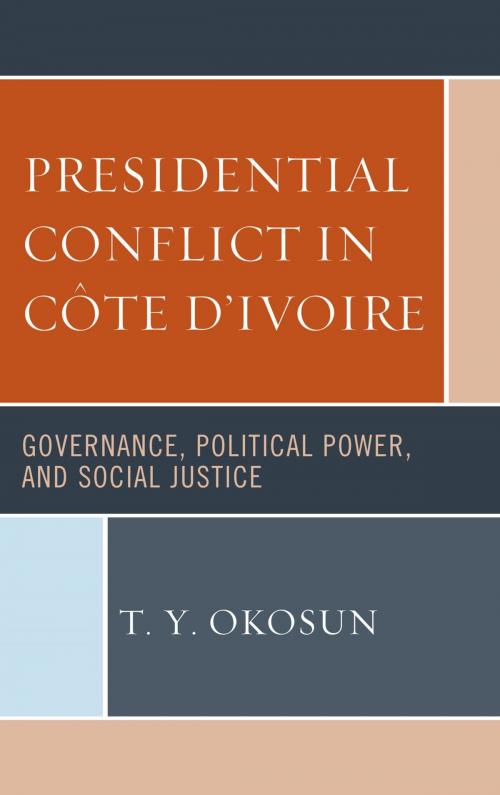Presidential Conflict in Côte d’Ivoire
Governance, Political Power, and Social Justice
Nonfiction, Social & Cultural Studies, Political Science, Politics, Economic Conditions, International, International Relations| Author: | T. Y. Okosun | ISBN: | 9781498566568 |
| Publisher: | Lexington Books | Publication: | December 27, 2017 |
| Imprint: | Lexington Books | Language: | English |
| Author: | T. Y. Okosun |
| ISBN: | 9781498566568 |
| Publisher: | Lexington Books |
| Publication: | December 27, 2017 |
| Imprint: | Lexington Books |
| Language: | English |
Presidential Conflict in Côte d’Ivoire: Governance, Political Power, and Social Justice explores the 2011–2012 presidential conflict in Cȏte d’Ivoire, focusing on the conflict’s impact on governance, political power, civil society, security, and social justice. The book examines the ways in which dictatorial governance detracts from democratic and civil society aspiration, the intersection of power based conflict and its impact on citizens and their security, and the role ethnic sentiments and negation play in de-emphasizing the humanity of non-favored groups. Moreover, the presidents’ conflicting perspectives on the nature of governance and political power marginalized concerns specifically regarding the significance of democracy, civil society, and social justice. Despite President Laurent Gbagbo’s challenge and demand for democracy, his presidency was unable to avoid morphing into dictatorial and autocratic governance. Autocracy and dictatorship had already inseminated Cȏte d’Ivoire during the thirty years of President Felix Houphouët-Boigny’s benign dictatorship. It is within this rigidity that Gbagbo, a product of Ivoirian socio-political history, socialized in dictatorial, ethnic, and elite sentiments, constructed his version of autocracy and dictatorship, and refused to yield power to a new president elect, Alassane Ouattara, triggering a national presidential conflict.
This analysis of the presidential conflict is an effort to forestall future similar issues around the globe, but specifically in poor and developing nations, from destabilization and violence. The book concludes with an African Conflict Transformation model constructed as a consultative option for political conflict mitigation purposes.
Presidential Conflict in Côte d’Ivoire: Governance, Political Power, and Social Justice explores the 2011–2012 presidential conflict in Cȏte d’Ivoire, focusing on the conflict’s impact on governance, political power, civil society, security, and social justice. The book examines the ways in which dictatorial governance detracts from democratic and civil society aspiration, the intersection of power based conflict and its impact on citizens and their security, and the role ethnic sentiments and negation play in de-emphasizing the humanity of non-favored groups. Moreover, the presidents’ conflicting perspectives on the nature of governance and political power marginalized concerns specifically regarding the significance of democracy, civil society, and social justice. Despite President Laurent Gbagbo’s challenge and demand for democracy, his presidency was unable to avoid morphing into dictatorial and autocratic governance. Autocracy and dictatorship had already inseminated Cȏte d’Ivoire during the thirty years of President Felix Houphouët-Boigny’s benign dictatorship. It is within this rigidity that Gbagbo, a product of Ivoirian socio-political history, socialized in dictatorial, ethnic, and elite sentiments, constructed his version of autocracy and dictatorship, and refused to yield power to a new president elect, Alassane Ouattara, triggering a national presidential conflict.
This analysis of the presidential conflict is an effort to forestall future similar issues around the globe, but specifically in poor and developing nations, from destabilization and violence. The book concludes with an African Conflict Transformation model constructed as a consultative option for political conflict mitigation purposes.















